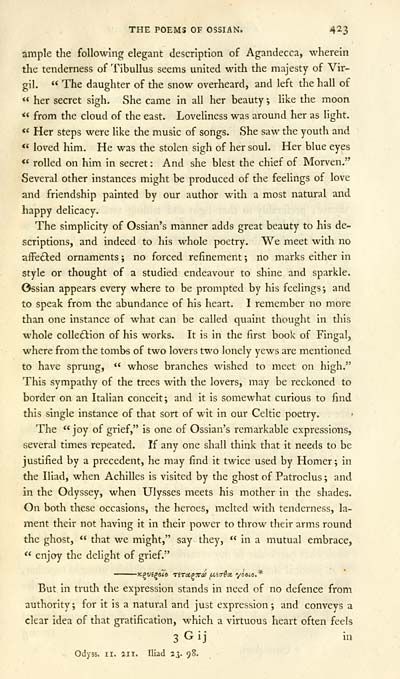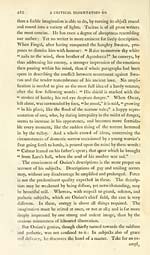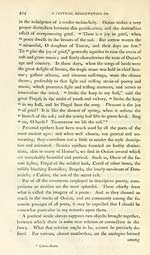Download files
Complete book:
Individual page:
Thumbnail gallery: Grid view | List view

THE POEMS OF OSSIAN. 423
ample the following elegant description of Agandecca, wherein
the tenderness of Tibullus seems united with the majesty of Vir-
gil. " The daughter of the snow overheard, and left the hall of
« her secret sigh. She came in all her beauty -, like the moon
« from the cloud of the east. Loveliness was around her as light.
*< Her steps were like the music of songs. She saw the youth and
*' loved him. He was the stolen sigh of her soul. Her blue eyes
<' rolled on him in secret : And she blest the chief of Morven."
Several other instances might be produced of the feelings of love
and friendship painted by our author with a most natural and
happy delicacy.
The simplicity of Ossian's manner adds great beauty to his de-
scriptions, and indeed to his whole poetry. We meet with no
afFedted ornaments ; no forced refinement ; no marks either in
style or thought of a studied endeavour to shine and sparkle.
Ossian appears every where to be prompted by his feelings; and
to speak from the abundance of his heart. I remember no more
than one instance of what can be called quaint thought in this
whole coUeftion of his works. It is in the first book of Fingal,
where from the tombs of two lovers two lonely yews are mentioned
to have sprung, " whose branches wished to meet on high."
This sympathy of the trees with the lovers, may be reckoned to
border on an Italian conceit; and it is somewhat curious to find
this single instance of that sort of wit in our Celtic poetry. >
The " joy of grief," is one of Ossian's remarkable expressions,
several times repeated. If any one shall think that it needs to be
justified by a precedent, he may find it twice used by Homer; in
the Iliad, when Achilles is visited by the ghost of Patroclus ; and
in the Odyssey, when Ulysses meets his mother in the shades.
On both these occasions, the heroes, melted with tenderness, la-
ment their not having it in their power to throw their arms round
the ghost, " that we might," say they, " in a mutual embrace,
" enjoy the delight of grief."
But in truth the expression stands in need of no defence from
authority; for it is a natural and just expression; and conveys a
clear idea of that gratification, which a virtuous heart often feels
3 G ij in
Odyss. II. Jii. Iliad a^. 98.
ample the following elegant description of Agandecca, wherein
the tenderness of Tibullus seems united with the majesty of Vir-
gil. " The daughter of the snow overheard, and left the hall of
« her secret sigh. She came in all her beauty -, like the moon
« from the cloud of the east. Loveliness was around her as light.
*< Her steps were like the music of songs. She saw the youth and
*' loved him. He was the stolen sigh of her soul. Her blue eyes
<' rolled on him in secret : And she blest the chief of Morven."
Several other instances might be produced of the feelings of love
and friendship painted by our author with a most natural and
happy delicacy.
The simplicity of Ossian's manner adds great beauty to his de-
scriptions, and indeed to his whole poetry. We meet with no
afFedted ornaments ; no forced refinement ; no marks either in
style or thought of a studied endeavour to shine and sparkle.
Ossian appears every where to be prompted by his feelings; and
to speak from the abundance of his heart. I remember no more
than one instance of what can be called quaint thought in this
whole coUeftion of his works. It is in the first book of Fingal,
where from the tombs of two lovers two lonely yews are mentioned
to have sprung, " whose branches wished to meet on high."
This sympathy of the trees with the lovers, may be reckoned to
border on an Italian conceit; and it is somewhat curious to find
this single instance of that sort of wit in our Celtic poetry. >
The " joy of grief," is one of Ossian's remarkable expressions,
several times repeated. If any one shall think that it needs to be
justified by a precedent, he may find it twice used by Homer; in
the Iliad, when Achilles is visited by the ghost of Patroclus ; and
in the Odyssey, when Ulysses meets his mother in the shades.
On both these occasions, the heroes, melted with tenderness, la-
ment their not having it in their power to throw their arms round
the ghost, " that we might," say they, " in a mutual embrace,
" enjoy the delight of grief."
But in truth the expression stands in need of no defence from
authority; for it is a natural and just expression; and conveys a
clear idea of that gratification, which a virtuous heart often feels
3 G ij in
Odyss. II. Jii. Iliad a^. 98.
Set display mode to: Large image | Transcription
Images and transcriptions on this page, including medium image downloads, may be used under the Creative Commons Attribution 4.0 International Licence unless otherwise stated. ![]()
| Early Gaelic Book Collections > Ossian Collection > Poems of Ossian, the son of Fingal > (435) |
|---|
| Permanent URL | https://digital.nls.uk/77928542 |
|---|
| Description | Selected books from the Ossian Collection of 327 volumes, originally assembled by J. Norman Methven of Perth. Different editions and translations of James MacPherson's epic poem 'Ossian', some with a map of the 'Kingdom of Connor'. Also secondary material relating to Ossianic poetry and the Ossian controversy. |
|---|
| Description | Selected items from five 'Special and Named Printed Collections'. Includes books in Gaelic and other Celtic languages, works about the Gaels, their languages, literature, culture and history. |
|---|

